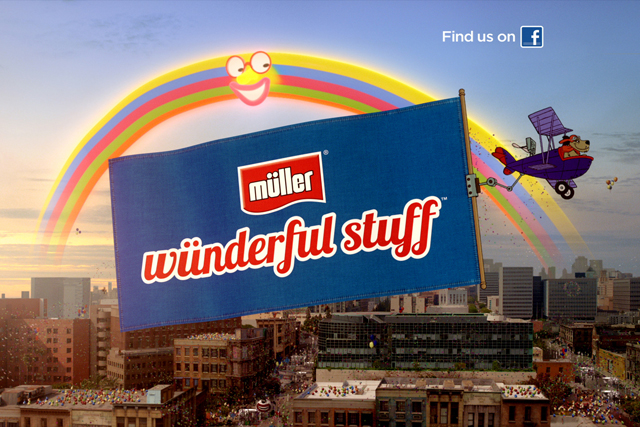
Muller is the dominant player in the yoghurt category. Its three core brands, Muller Corner, Muller Light and Muller Rice, pull in annual sales of almost £400m.
However, as Tesco's recent travails show, even the mighty can find themselves flailing. One would think that a £20m investment in a new-look campaign would herald good times for a brand.
However, the launch of Muller's 'Wunderful Stuff' ads in October was met with a mixed response, to say the least. As the campaign, an animation-fest featuring Yogi Bear, Mutley and the Mr Men, hit screens, UK chief executive Gharry Eccles left the firm amid a shake-up of personnel.
Marketing director Lee Rolston, the brains behind the revamped creative strategy, also departed the German-owned business.
Whether consumers liked the ad or not, the campaign, which debuted during the first live The X Factor episode of the series, was pulled in favour of product-led ads, which had first aired in 2007.
So, it was out with the campaign, out with the ad agency; TBWA\London resigned the account in December. Not to be sidetracked by marketing issues, last month Muller acquired the UK's biggest fresh milk producer, Robert Wiseman Dairies, for £280m. The deal opens up a fresh sub-category for Muller and offers potential brand crossover opportunities.
With so much confusion around its marketing message, what should Muller do to get back on track?
We asked Simeon Adams, partner at Goodstuff Communications and a former planner on the Yeo Valley account at Bartle Bogle Hegarty, and former Greggs and Burger King marketer Michele Young, now director of Foodservice Support and frozen yoghurt business CoolberryCafe.
TIMELINE
October 2011: £20m 'Wunderful Stuff' campaign launched
November: Marketing director Lee Rolston left, amid changes that included the departure of chief executive Gharry Eccles
December: TBWA\London resigned ad account
January 2012: 北京赛车pk10 replaced by ads launched in 2007
 SIMEON ADAMS - GOODSTUFF COMMUNICATIONS (FORMER PLANNER ON YEO VALLEY ACCOUNT)
SIMEON ADAMS - GOODSTUFF COMMUNICATIONS (FORMER PLANNER ON YEO VALLEY ACCOUNT)
I clearly remember the night it 'went wrong' for poor, market-leading Muller. Glued to The X Factor to watch the launch night of the second Yeo Valley TV campaign, I was also treated to Muller's lavish, epic 'brand film'.
I appreciate that I scrutinised the spot more than 99.99% of viewers, but nevertheless I was gobsmacked.
I actually enjoyed the first viewing, but I couldn't get over the fact that the market leader had appeared to respond to the challenger.
I think it did so in the worst possible way. It tried to buy fame instead of earning it, aping the challenger's Super Bowl strategy; it backed an advertising idea rather than a marketing idea; and it threw the kitchen sink at creating the veneer of an engaging campaign, instead of constructing one from the ground up.
Then it seemed to adopt a scorched-earth media strategy. This was underlined a few days later when a colleague pointed out that Muller had cover-wrapped Sport magazine. Other than a tenuous link to commuters, I couldn't understand why.
REMEDY
- Refocus attention on the brand, not the competition. Stick it out with 'Wunderful stuff', but root the campaign more overtly in the product.
- Drop the 'Shropshire dairy, wholesome British' schtick. To me it comes across as disingenuous and it just amplifies the credibility and integrity of competitors.
- When it comes to the next big brand launch, appreciate that sometimes, less is more.
MICHELE YOUNG - FOODSERVICE SUPPORT AND COOLBERRYCAFE (FORMERLY OF GREGGS AND BURGER KING)
When it comes to brand evolution and product development, it is a sin not to innovate. The same goes for becoming complacent or stuck within your comfort zone; you can't expect to get different results from doing the same thing over and over again. Muller's case may be an exception, however.
Its last campaign, 'Wunderful stuff', was a radical shift away from its previously well-recognised formula. It was indeed a wunderfully orchestrated animated ad, intended to reach fresh audiences.
It also seems to have been, unfortunately, a move too far away from familiarity.
The success of previous campaigns was a result of continued reinforcement of product benefits, coupled with images of the great outdoors, sunshine, happy, smiling people and a jolly tune that invoked the 'feelgood factor'.
While we are all surrounded by recessionary messages, reminding consumers about just how tasty and full of goodness its products are, really does work.
REMEDY
- Don't lose sight of the functional benefits. Health and wellness are high on everyone's agenda, so keep reinforcing the products' core attributes of being better for you.
- Promote Muller as one of life's affordable little luxuries, a small price to pay for some moments of indulgence.
- People buy dreams and aspirations.
Keep the feelgood factor in the advertising and the associations of Muller being a 'good mood' food.

